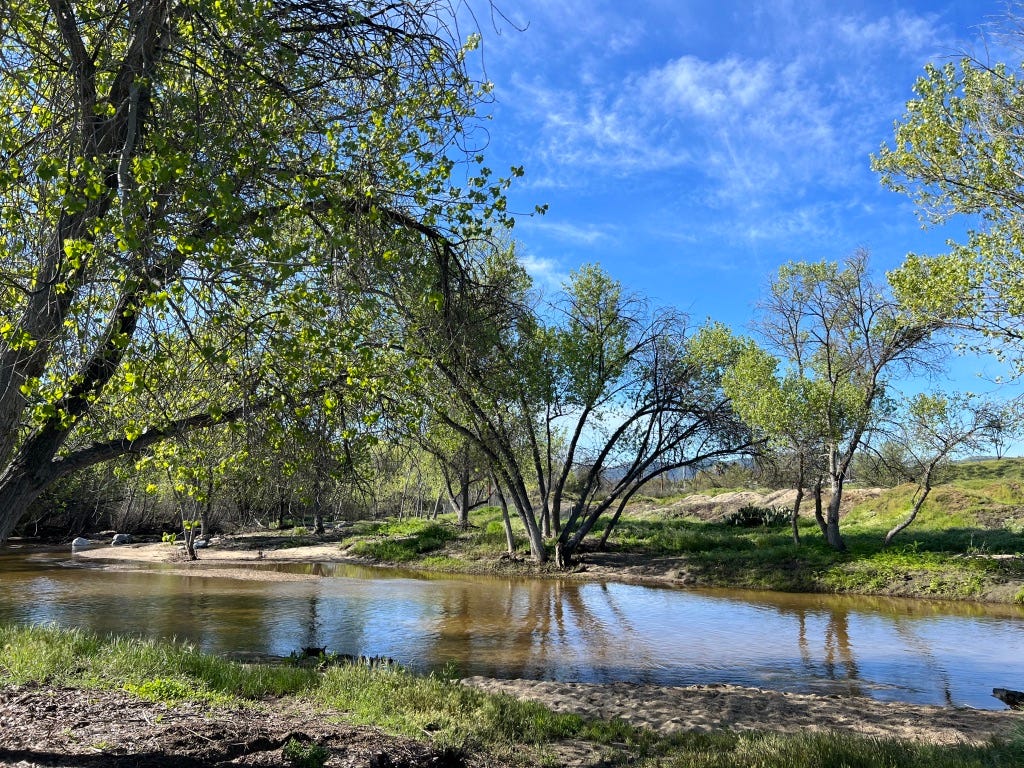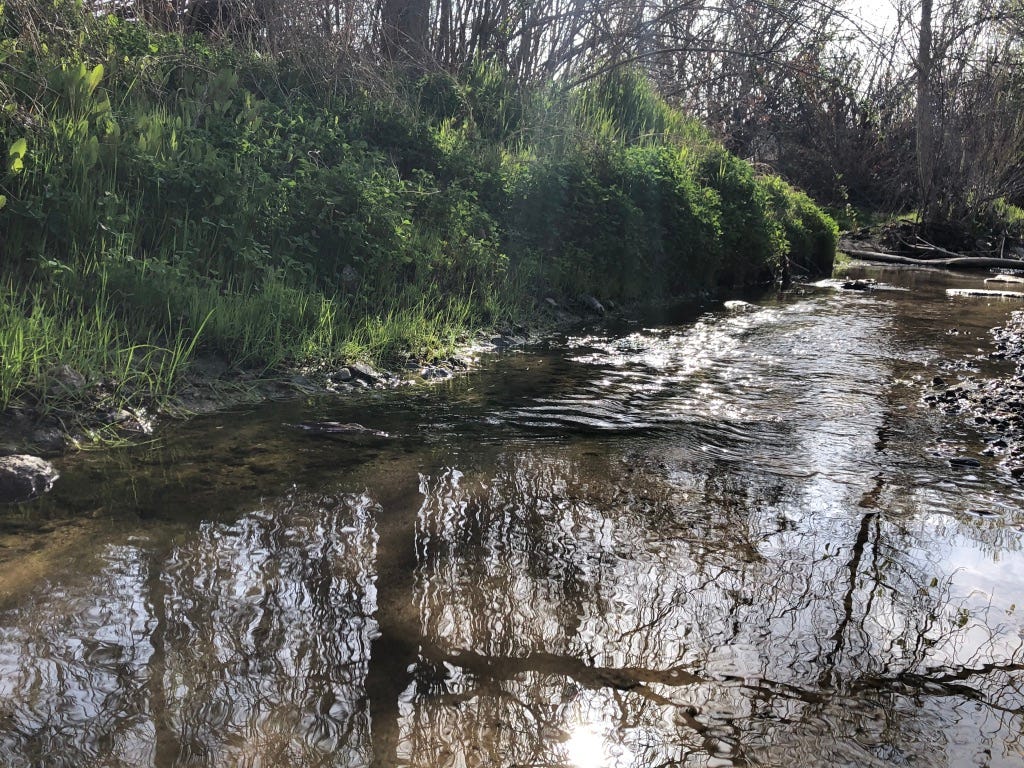Be angry and sin not; don’t let the sun go down on your wrath.
(A quick note for my readers who don't want to be subjected to Christianity, stick with me. I'm speaking out here, not furthering a Christian agenda.)
These are some scriptures that I grew up with. They're written on my heart. And I believe in them, as they've guided me to not turn to destruction when anger rises or to not hold on to it — going to bed angry at my husband or my kids.
And yet…
I don't feel I really understand anger. It's an emotion I've wrestled with in cycles. And it's something I'm imploring the Spirit to teach me: how to harness and express anger for my own healing. I've known better how to harness and channel anger constructively on behalf of others. But it's coming to my attention in recent weeks that I'm somewhat impaired when it comes to anger for processing my own needs.
I'm sharing my limitation with you, because I sense that there are many of us sensitive humans (especially women) who also approach anger like it's fragile glass. We don't want to touch it, maybe not even look at it and certainly not handle it. So maybe we can sort it out together or at least become more aware of its necessity in our lives. Yes, I believe that experiencing and expressing anger is a healing necessity.
We're all going to have times when we're frustrated, irritated or angry, and we strike out at someone. We're only humans being human. And that's when recognizing our fault and apologizing takes care of any long-term damage. But when there is no apology from the one who blows up on others and continues to do this, there's a lack of personal awareness and responsibility. Getting mad has become a release valve, but now that steam has scalded others — sometimes permanently. If harsh words are spoken that can never be taken back, there must be a repairing that can only happen with humility and grace. Unfortunately, those who habitually “lose it” on others with no personal accountability don’t often have this level of emotional maturity.
I'm writing this with compassion, because I know we all have old wounds and imprinting which cause us to handle anger in unhealthy ways. Anger outbursts can be a habit where other emotions and scars have not been dealt with — sometimes as a subconscious cover for fear or sadness. Or there is another issue going on, and we take out our frustration on someone else.
I have burst out with harsh words on people — especially toward my Mom when I was a teenager. I'm thankful that she doesn’t hold it against me and remembers me always apologizing. I think she understood the emotional complexity of my teen years and showed me a lot of grace.
I've also gone off on men in my life who I saw were treating women I loved unfairly or coldly. I felt it was my job to set them straight due to all the pain they were creating for the women I loved who were confiding in me. But in the end, I don't think it helped my loved ones or myself. It seemed to make things worse.
But for the most part, I've had a hard time with expressing anger, because I've seen the damage it can cause and because I've also been around dangerous, out-of-control anger. I also have a background where I was silenced and threatened with death after a traumatic attack at the hands of a short-term acquaintance, so expression of my own difficult emotions is something that comes with great fear for me.
I also believe that in the church — let me say the White American church, which I have been a part of for most of my life and which is primarily dominated by men in leadership — there is very little wisdom and discernment regarding the harder emotions of anger, fear and grief. If Jesus was a “man of sorrows and acquainted with grief,” and we see him exhibit anger, grief and sorrow — and even vulnerability/fear before and on the cross — it stands to reason that those who teach His words should be enlightened in these areas. My impression is many are not. I'm not sure that there is much directing and teaching toward truly following the Spirit’s guidance, because there is a focus on the more comfortable emotions — and to be honest, very little focus on the God-given gifts of emotions at all.
I've heard the platitude “we can't trust our feelings” in Christian circles more times than I can count. Divine promptings through our emotions have been held in suspicion and actually suppressed. I believe that this is the suppressing of the Spirit, and it most often happens toward women within the church. We learn to doubt ourselves and follow the rational ways of the patriarchal teachings — at the price of compassion and empathy which could go far in the church for developing the healthy community of Christ. And which also could go far to demonstrate the love of God in society, as I mentioned last week in A Voice of Reassurance.
But those softer skills are pushed down in many churches, families, workplaces and social settings, because there is too often an addiction to certainty and being right. I've grown out of some of this mindset myself, but I'm still leaning on God to show me the way as I've not been part of a local church for two years now.
So anger. Back to anger.
I've been working with a therapist monthly for nearly four years — and at times weekly, when I was in intensive therapy utilizing EMDR. After the first year of therapy, my therapist was ready to release me from regular visits, but I felt that I still needed a monthly check-in. Therapy has been very beneficial, and I give thanks for a therapist who is not a hand-holder and speaks firm truth with kindness. Recently, he let me know it was time to move to an as-needed basis, and I was okay with that. I've been working on other paths along with therapy that are helping me to grow and also to calm my nervous system which is essential for PTSD. So I released that therapy phase with gratitude.
And that opened a door for another counselor. In delving into the roots of my PTSD, she and I ascertained deep grief with long-bottled-up anger. She invited me to feel into that anger. These were emotions I couldn't access in the life-threatening attack, because the body kicks in with a survival mechanism. I was paralyzed with terror and powerlessness. Anger, fighting, grief — none of it had any chance in those moments. And then I was threatened into silence, so emotions thereafter also had no outlet —for fear of anyone finding out and terrible things happening at the hands of that dangerous acquaintance. All of this awareness was compartmentalized into my subconscious until vivid flashbacks started to occur in 2019. So I'm only recently fully understanding what happened and why I've had certain problems my entire life. I'm only recently beginning to understand that I've had PTSD since early childhood.
The counselor had to encourage and coax all of that deep grief, anger, rage and powerlessness out of me. And I resisted at first; there's fear with going there, but I did. Afterward I was exhausted. Going to those places is hard on the nervous system. Thankfully, I've learned enough over the years, so I was able to take care of myself in the following hours and days. But I still felt angry, irritable and confused with what to do with it all. And I found myself feeling angry about other times when I was attacked in various ways, and I didn’t feel supported. As I struggled with all of those emotions (which is part of grieving), I didn't want to hurt those around me. I briefly explained to my family that I was struggling after a tough session and not to take my turbulent atmosphere personally, as I kept to myself as much as possible except to vent with my husband. (Thank you so much, Dan, for being there for me.)
So although I know that crying, talking things out, raging into a pillow, writing, exercise, outdoor time all help with processing, I'm still asking God: where is there room and freedom for cleansing anger? Guide me with how to access the power of Your Consuming Fire to pour out anger in a healthy, healing way for my spirit. Show me the practices that channel anger, honoring it as sacred — anger that is sacred and not scared. Show all of us how to feel and express healing anger, Lord, especially those with trauma and oppressive backgrounds and those who are sensitive.
Recently, I was drawn to this podcast episode after having not listened to In the Light for months. The episode title intrigued me: “Protect Your Anger.” The host of In the Light, Dr. Anita Phillips, is a trauma therapist and Black minister who has deep understanding and compassion. Her guest hosts were Kobe and Kyle Campbell. I strongly suggest a listen — especially the exchange between Kobe and Kyle, which is maybe 20 minutes into the episode. They cover everything, as Kobe is also a trauma therapist, and her husband Kyle has done a lot of therapy for childhood and religious trauma. This summed up so much of their conversation:
Anger tells us that boundaries are needed. Anger tells us that something needs to be protected. So when we skip over feeling the anger that comes from the grief or recognizing just how bad our situations were, we skip over the emotional resource that fuels our ability to set boundaries that establish our worth and protect our worth.
They explain that anger arises when your value or the value of those around you is not honored. In the case of trauma survivors, there's a lot of value that was not honored. Anger is understandable, and it's necessary for healing. This is what the Divine Source of Love and Truth wants to show us. But too often, the church or faith communities discourage that in us. At one point in the conversation, Kyle shared about growing up as a pastor’s kid, and the lack of emotion he saw in the males in the church. He shared how they were lauded as mature, but Kyle now recognizes that wasn’t the case; they were emotionally numb.
If you grow up around people who are emotionally numb, you normalize emotional numbness and call it maturity.
That is some stunning truth, and points to what I have been getting at regarding the church. If the leaders do not possess emotional maturity, empathy and compassion, then those things will not be valued within that community. Mental health will be downplayed or even mocked. As we look around our society, I think we can see that lack of connected, empathetic leadership in many areas where major decisions are being made: churches, political arenas, schools, workplaces, etc. While there are definitely individuals in leadership who understand the value of our collective humanity, I don’t think society is at that point as a whole.
In order to have the emotional support we need as we access difficult emotions, we need understanding listeners: counselors, therapists, emotionally-mature friends and family. We need the guidance of the Spirit most of all. And that’s what I am relying on as I work through the confusing times of grief where anger shows up. And I’m curious for your thoughts and experiences about anger and how to deal with it in a healthy way. I’d love for you to leave a comment or reply to this email with any thoughts.
And remember friends as we deal with uncomfortable emotions and heart-wrenching situations in life, the healing that we allow contributes to our growth as evolved humans — and not just for us but for those around us. All of this messy human experience has worth. So let’s remember: the healers are rising and are transforming the times we live in. The healers are rising and you are one of them.
Thank you for reading these thoughts.
With love,
Jen







Love your writing, Jen. I think there may be something for me to work on there. I have little anger toward people, except for what I see as being led down the wrong path by christian church teachings. The idea that they have all the answers, when in fact, they have very little of the answers. I'm still sorting out whether it is God or the church that I'm most angry at. I really appreciate your balanced and wise approach.
Thank you Jen for sharing this at a time in my life when I am trying to understand and deal with my own anger.